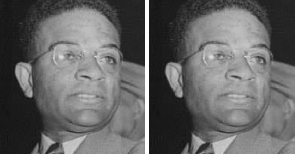 Charles Diggs Sr/Photo credit: @HistoryLivesDet on Twitter
Charles Diggs Sr/Photo credit: @HistoryLivesDet on Twitter
or many years, Charles Diggs Sr. was not happy with the way and manner blacks were buried in the early 1900s. He felt they deserved a better burial, like how whites were being buried in those days. Though James H. Cole charted the path of giving the dead a befitting burial in 1919, Charles popularized laying blacks to rest in dignity. He began his job in 1921 when he established a small funeral home on St. Antoine Street and East Adams in the heart of Paradise Valley, and subsequently relocated to 1391 Mullet Street at Russell in Black Bottom.
His role came in handy when racial discrimination and racism made it difficult to find a dignified land to bury African Americans. Charles found a plot and designated it as a cemetery to serve the needs of the black community in Detroit. His business provided a much-needed service to the black community, ensuring that they had dignified and befitting burials.
During that time, racial segregation was rampant, and many white-owned funeral homes refused to provide services to black families, leaving them with limited options for honoring and burying their loved ones with the respect they deserved, according to the Michigan Chronicle.
Charles’ decision to create a funeral home was to right the injustices done specifically to black families. This earned him a reputation for providing quality services and ensuring that every aspect of the funeral process was handled with the utmost care and respect. Years later, he set up the Detroit Metropolitan Mutual Assurance Company, a full-service life insurance firm, which at one point secured $10 million worth of business.
Charles included a realty business and a flower shop to his businesses, and soon became a prominent figure in the black community. His funeral home was widely respected for its professionalism, compassion, and attention to detail – it played an instrumental role in bringing comfort and closure to countless families who had lost loved ones.
He also provided employment opportunities for many black individuals, helping to strengthen the economic foundation of the community. Charles and his friends were also interested in the voting rights of African Americans, and on November 7, 1936, his work paid off when he was elected to the Michigan Senate as the first Democrat in the history of Detroit.
He used his position to push for equal and fair employment for the African American community, which resulted in what has become known as the Diggs Law, after his signature legislation was passed in 1937. This made discrimination on the basis of race, color, or creed criminal.
Charles Diggs, Sr.’s legacy lives on today. He is remembered as a pioneer who broke barriers and provided an essential service to the black community during a time of great injustice. His courage, determination, and entrepreneurial spirit continue to inspire others to make a positive impact in their communities. He died on April 25, 1967, at the age of 73, and was survived by a wife and a son.